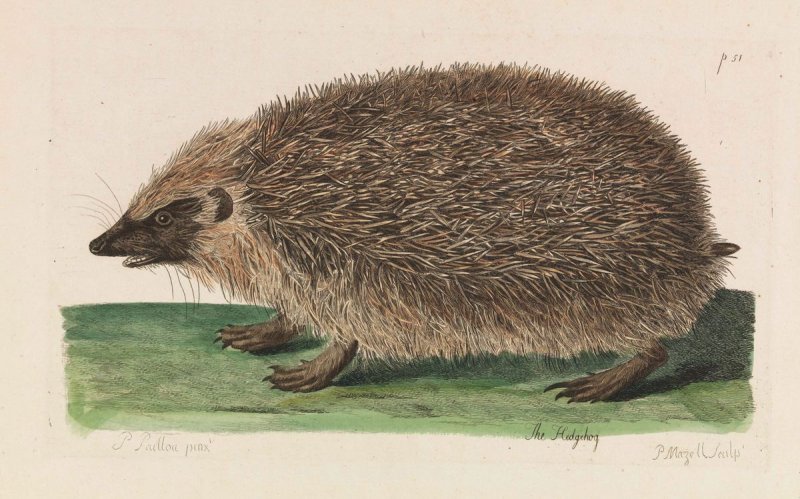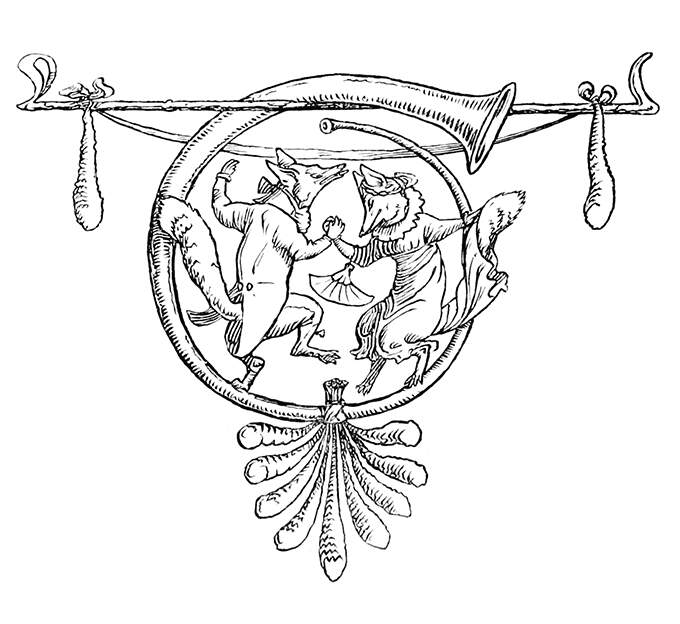De Critters’ Dance
By Paul Laurence Dunbar
Annotations by Rene Marzuk

Ain't nobody nevah tol' you not a wo'd a-tall, 'Bout de time dat all de critters gin dey fancy ball? Some folks tell it in a sto'y, some folks sing de rhyme, 'Peahs to me you ought to hyeahed it, case hit's ol' ez time. Well, de critters all was p'osp'ous, now would be de chance Fu' to tease ol' Pa'son Hedgehog, givin' of a dance;[1] Case, you know, de critter's preachah was de stric'est kin', An' he nevah made no 'lowance fu' de frisky min'. So dey sont dey inbitations, Racoon writ 'em all, "Dis hyeah note is to inbite you to de Fancy Ball; Come erlong an' bring yo' ladies, bring yo' chillun too, Put on all yo' bibs and tuckahs, show whut you kin do." W'en de night come, dey all gathahed in a place dey knowed, Fu' enough erway f'om people, nigh enough de road, All de critters had ersponded, Hop-Toad up to Baih, An' I's hyeah to tell you, Pa'son Hedgehog too, was daih. Well, dey talked an' made dey 'bejunce, des lak critters do, An' dey walked an' p'omenaded 'roun' an' thoo an' thoo;[2] Jealous ol' Mis' Fox, she whispah, "See Mis' Wildcat daih, Ain't hit scan'lous, huh a'comin' wid huh shouldahs baih?" Ol' man T'utle was n't honin' fu' no dancin' tricks, So he stayed by ol' Mis' Tu'tle, talkin' politics; Den de ban' hit 'mence a-playin' critters all to place, Fou' ercross, an' fou' stan' sideways, smilin' face to face. 'Fessah Frog, he play de co'net, Cricket play de fife, Slews o' Grasshoppers a-fiddlin' lak to save dey life; Mistah Crow, 'he call de figgers, settin' in a tree, Huh, uh! how does critters sasshayed was a sight to see. Mistah Possom swing Mis' Rabbit up an' down de flo', Ol' man Baih, he ain't so nimble, an' it mek him blow; Raccoon dancin' wid Mis Squ'il squeeze huh little han', She say, "Oh, now ain't you awful, quit it, goodness lan'!" Pa'son Hedgehog groanin' awful at his converts' shines, 'Dough he peepin' thoo his fingahs at dem movin' lines, 'Twell he cain't set still no longah w'en de fiddles sing, Up he jump, an' bless you, honey, cut de pigeon-wing.[3] Well, de critters lak to fainted jes' wid dey su'prise, Sistah Fox, she vowed she was n't gwine to b'lieve huh eyes; But dey could n't be no 'spurtin' 'bout it any mo': Pa'son Hedgehog was a-cape'in' all erroun' de flo'. Den dey all jes' capahed scan'lous case dey did n't doubt, Dat dey still could go to meetin'; who could tu'n 'em out? So wid dancin' an' uligion, dey was in de fol', Fu' a-dancin' wid de Pa'son could n't hu't de soul.

DuNBAR, Paul Laurence. “de critters’ dance.” The southern Workman, VOL. XXIX, NO. 11 (November 1900): 608-09.
[1] Hedgehogs are not native to America.
[2] p’omenaded: i.e. promenaded.
[3] According to the University of Wisconsin-Madison’s Dictionary of American Regional English, to cut the pigeon’s wing is to execute intricate dance steps gracefully.
Contexts
Paul Laurence Dunbar’s poem appeared in The Southern Workman magazine, an American journal “devoted to the interests of the black and red races,” according to its cover page. The magazine included sections on education and suggestions for school lessons. Dunbar received international acclaim for his dialect verse, but he also wrote many poems in standard English. Although the dialect may appear challenging, reading “De Critters’ Dance” aloud helps make the meanings clear.
Definitions from Oxford English Dictionary:
- fiddle: A stringed instrument of music, usually the violin.
- fife: A small shrill-toned instrument of the flute kind, used chiefly to accompany the drum in military music.
- parson: A vicar or any other beneficed member of the clergy of the Church of England; a chaplain, curate, or any Anglican clergyman; a minister or preacher of any Christian denomination, a clergyman. Sometimes with pejorative connotation.
- meeting: An assembly of people for worship.
- sashay: To perform a chassé, especially in square dancing.
Resources for Further Study
- Michael Cohen offers a contextual analysis of Dunbar’s dialect poetry.
- Dunbar’s home in Dayton, Ohio, is currently a historic site open to the public.